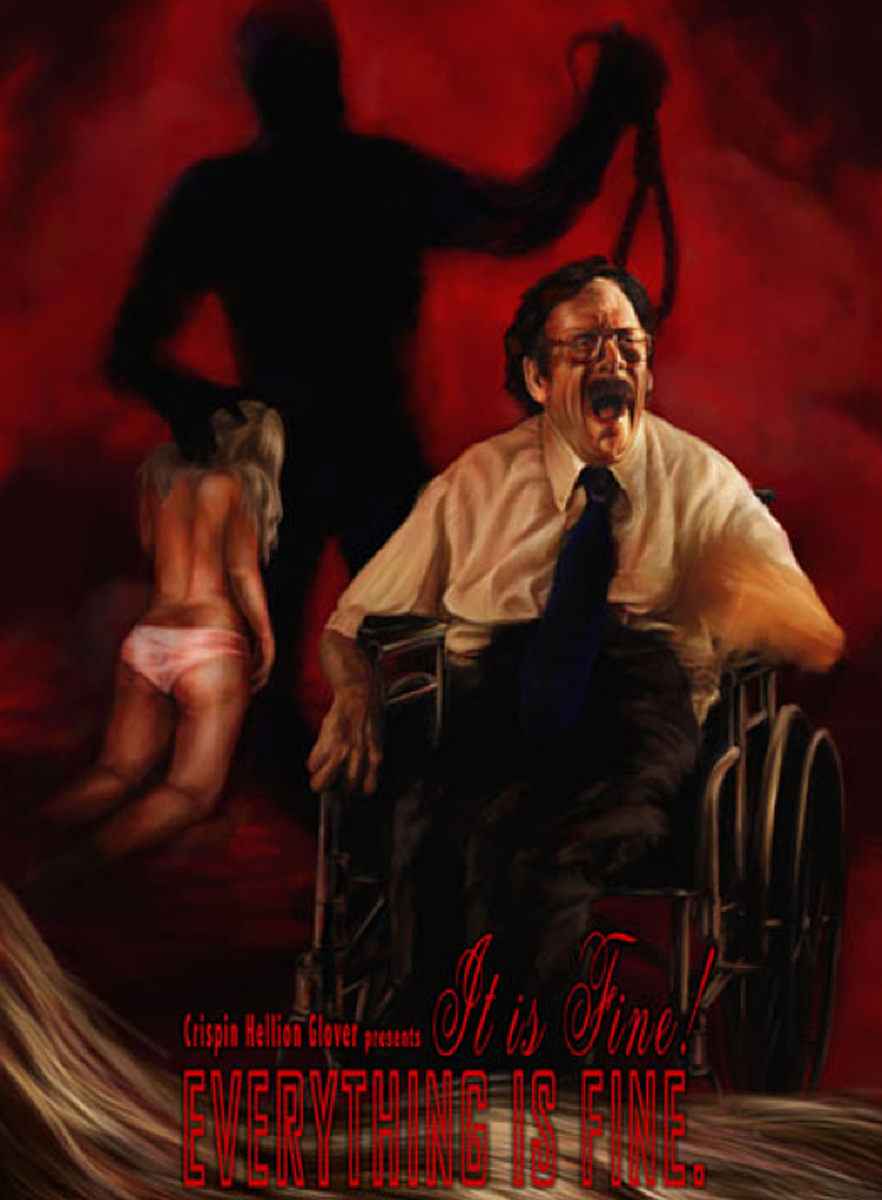Story by Elise Elshire
Photo courtesy of Crispin Glover
This weekend for three nights the actor you probably know as the “creepy” Thin Man from Charlie’s Angels or as George McFly from Back to the Future brings his tour to Eugene. Glover is recognized for his unique, eccentric roles in Hollywood films, but also produces his own independent work.
Every show at the Bijou Arts Cinemas will be different as Glover will showcase a range of work. Each night he will perform either part one or part two of Crispin Hellion Glover’s Big Slide Show. Each slide show is a one-hour dramatic narration of the eight illustrated books Glover has authored.
Depending on the night, Glover will also screen one of his two films, What is It? or It is Fine! EVERYTHING IS FINE, both part of the It trilogy. What is It? features actors with Down syndrome; Glover describes the movie as “ my psychological reaction to the corporate
restraints that have happened in the last twenty to thirty years in filmmaking.” Part two of the trilogy, It is Fine! EVERYTHING IS FINE, further explores that reaction and stars Steven C. Stewart, a man with cerebral palsy, who also wrote the screenplay in the late 1970s.
Touring with his films and slide shows and using mixed mediums gives the event a vaudeville feel, says Glover. All of the shows will conclude with a Q&A session and a book signing. Prior to his debut at the Bijou, Ethos communicated with Glover via email about his experiences as a Hollywood actor and an independent artist.
Elise Elshire: Who were some early influences for you as an artist?
Crispin Glover: I always drew and wrote as a child. I liked [Hieronymus] Bosch and [Salvador] Dali as painters when I was a child. I saw Tod Browning’s Freaks when I was a child and was quite favorably impressed by that. My father is an actor and my mother retired from her primary profession as a dancer and secondary profession as an actress when I was born. As I was growing up watching my father work in the film industry I did not necessarily equate the business of acting with art as much as seeing it as a business.
I became a professional actor at age thirteen by my own choice. I emphasize that because there is a large difference in that from when a child is forced in to acting by parents who choose that career for a child. I began studying in a professional acting class at age fifteen. At age sixteen I viewed many revival films of the 1920s through the 1970s at the revival theaters that were popular in the early 1980s before the advent of VHS competition that led to most of the revival houses closing. While watching many of the films and being in acting class I began to understand film and acting as art.
EE: When people recognize you on the streets, what do they remember you from?
CG: By far the most approaches I get from people are when they have seen me in multiple films. Different age groups will recognize me from different things. Right now younger children will recognize me from being in Alice in Wonderland, but as I say, by far the most recognition and approach come from people seeing me in multiple films.
EE: Your work includes much more than film. You’ve written books, recorded the album The Big Problem Does Not Equal the Solution, The Solution Equals Let It Be, and released various original songs and music videos. All of these have contributed to a large cult following surrounding you. What is your response to this?
CG: I rely on the fact that people are interested in seeing my live show and personal filmmaking by the fact that I have worked in the corporate film industry and delved in to other media for three decades now. It is a good business element and I feel grateful that I am able to continue to explore areas of interest to me in fields that I enjoy.
EE: Many of your roles and work have been labeled as eccentric. How do you feel about this and do you believe you’re an eccentric person?
CG: I do not view eccentric as a negative term. I view it as a poetic interpretation of a mathematical term meaning something that does not follow a centric course. Many of the characters I have played can be called eccentric. My own films and books can be called eccentric. I find all of this fine. I publish my own books, produce, finance, direct, edit, and distribute my own films. Publishing, producing, financing, directing, editing, and distribution all have extremely centric elements to them that have to be followed in order for results to happen. Because I spend a good amount of time performing those very centric tasks it means that I have very centric qualities in my day-to-day life, even if the art I am interested in can be perceived as eccentric.
EE: If you had to permanently become one of your characters, who would it be and why?
CG: One of the main concepts of the kind of acting I was taught has to do with taking portions of one’s own psychology and applying it to the psychology that is pertinent to the character that one is portraying. I would say I have never played a character that is truly similar to my own self. I am glad to live the life of my own self and would not want to live the life or psychology of any of the characters I have played.
EE: Why come to the Bijou Arts Cinemas?
CG: I was contacted by a student from the University of Oregon: Matt Nixon. He contacted me via my web site CrispinGlover.com. I often book my tours with the ease at booking. I get a lot of queries and I end up going to where the people are the most aggressive about having me at their venue and if it works out schedule-wise.
EE: Have you been to Eugene before? What are your impressions of the city?
CG: I was in Eugene at the University of Oregon many years ago performing my slide show and showing an early cut of “What is it?” I was not in Eugene very long but I found it to be very pretty.
EE: You’ve been acting since you were a teen. How do you think your style has changed since you first started?
CG: I am not sure that my style of acting has changed that much since I was a teen, but I probably would say that my natural energy has changed as I have gotten older and that of course would come off differently in performances to a certain extent.
EE: Do you ever wish you’d been to college? Why or why not?
CG: I graduated from Mirman School for Gifted Children, which I attended from first to ninth grade. It was an excellent academically inclined school. By far most graduates of that school certainly went to college and often to the most desirable and competitive higher education facilities. In high school I always kept my grades up and planned to attend higher education. I started studying acting professionally at age fifteen and continued studying for five years till I was twenty.
I started getting a lot of work in film once I turned eighteen because there were no longer child labor law restrictions at that age. Going to higher education at that time would have been counterproductive to my career as an actor, and I do not regret not going to college or university. Higher education is obviously absolutely imperative in certain fields. It was not imperative in my field. I still enjoy true education and have great respect for it. I often listen to many university course lectures from a great company called The Teaching Company.
There is a certain type of exchange that can happen in higher education that is extremely valuable, but again I do not have any regrets in not attending higher education.
Shows are at 8:30pm November 19th, 20th, and 21st. Each program is different, and descriptions of each night’s lineup can be found at crispinglover.com. Tickets are available now for $20 each at the Bijou box office, which is open 4:30 to 11pm weekdays, and 2 to 11:30 pm weekends.









